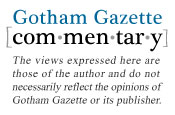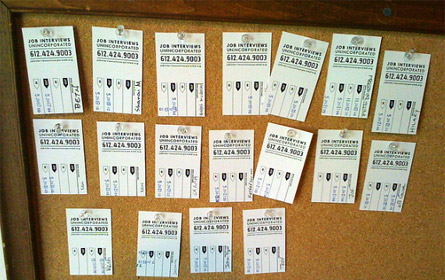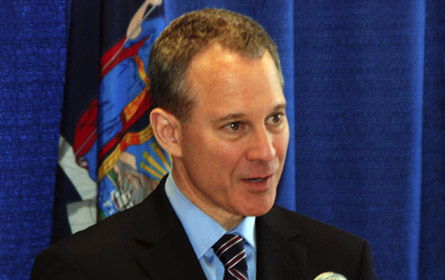On Fracking, the Cuomo Administration Strikes a Balance

(For an opposing viewpoint, see The Cuomo Administration Must Slow Down by Eric Goldstein of the Natural Resources Defense Council.)
The possible expansion of natural gas development in New York's Southern Tier has polarized New Yorkers like few issues have in recent years. On Jan. 1, Gov. Andrew Cuomo and his administration inherited the matter. Whatever they decided, they would have to deal with the issue directly, calmly and with political courage. After all, drilling opponents had already spent been two years cultivating opposition against hydraulic fracture stimulation technology.
Shortly after taking office, Cuomo appointed long-time Open Space Institute head Joe Martens as commissioner of the Department of Environmental Conservation -- a decision immediately hailed by environmental groups as a key to their defeat of expanded natural gas exploration in New York.

Oil and gas developers also wondered what the Martens appointment would mean to the industry, which employs about 4,500 people across the state. The industry watched as business and opportunity fled New York to work in the same Marcellus Shale gas field beneath Pennsylvania, West Virginia and Ohio.
The DEC Deliberates
Martens was previously an open critic of natural gas extraction using hydraulic fracturing. But he also has a great deal of energy policy experience and understands the relationship between energy, the environment and the economy. In fact, in his announcement of the appointment, the governor said, "Joe knows how to strike the critical balance between defending our natural resources from pollution and destruction while at the same time fostering a climate of economic renewal and growth."
It seems the commissioner is doing just that. Fast-forward nine months from his appointment and we have seen the birth of a new draft of drilling permit rules – known as the Supplemental Generic Environmental Impact Statement, or SGEIS. The administration has allowed Department of Environmental Conservation experts, including geologists and engineers, to modify the statement, resulting in the most stringent set of rules in the nation, and perhaps the world. Whether they are too stringent, and therefore restrictive of business development, remains to be determined. Industry is still evaluating the 1,500-page document. The public comment period ends Dec. 12.
A Proven Technology
In total it has been three years since a previous administration enacted a de facto moratorium on natural gas extraction using horizontal drilling and hydraulic fracturing. My own employer, Norse Energy Corp., has dealt with the consequences of this delay. Four years ago Norse decided to focus our exploration efforts on shale drilling in New York and hired an expert staff of surveyors, geologists, engineers, geophysicists, technicians, accountants, land agents and even hydrologists (to assure protection of water resources) to work in western and central New York. We even had plans to double our staffing and employ more than 100 people directly with hundreds more indirect jobs. Now instead of additions we have been forced to subtract -- reducing our workforce by more than half since the beginning of the year -- because expected opportunities went unrealized.
Protesters have focused on hydraulic fracturing. The term fracking has become a rally point as if it were a new, unknown technology. In fact, hydraulic fracturing has been in commercial use for about 60 years, and it has been used to free oil and natural gas resources more than one million times in 32 states nationwide, and here in New York, too. Ironically, water well drillers often hydraulically fracture their wells to improve production.
Natural gas is part of the historical fabric of New York. In 1821, the nation's first gas well was "dug" in Fredonia, in western New York near the banks of Lake Erie. Natural gas became a commercially viable energy source shortly thereafter. Since then, 75,000 oil and gas wells have been drilled in New York.
Today, there are more than 14,000 wells that are still active and operating safely. The vast majority of these wells have been hydraulically fractured. You can drive across the Southern Tier and see the wellheads on farms, schoolyards, college campuses and church grounds. While a reclaimed Marcellus Shale well requires a larger footprint, it will not be an eyesore, especially when you consider what it will produce: jobs, tax revenue, royalty payments, energy independence and an economic boost that the Southern Tier has never seen before.
Natural gas also will be part of the nation’s energy future. A recent Massachusetts Institute of Technology study highlighted the significant role natural gas will have on the future of transportation, energy production and greenhouse gas reduction. The point here is that natural gas has been, and will remain, a positive component in our efforts to improve air quality and environmental quality in New York.
The governor and commissioner have vowed to let science rule the discussion, and so far they have done that. They both have cautioned that energy development must be deemed safe before it is allowed to expand in New York, but that the state also has energy and economic needs. New York is at a critical point as it pursues the safe development of natural gas deep underground -- ever mindful of protecting our precious natural resources closer to the surface.
The governor's administration has said balance is key. Our industry agrees.
S. Dennis Holbrook is executive vice president of Norse Energy in Buffalo and a director of the Independent Oil and Gas Association of New York.
City Shuts the 'Box' to Open Job Opportunities

It's daunting enough to look for a job when there are over four unemployed workers for every opening. It's even harder when you desperately want work but have a criminal record -- as 65 million U.S. adults do.
Thankfully, New York City recently took steps to help reduce one of the obstacles people with criminal records face when applying for a job.
Last month, Mayor Michael Bloomberg issued an executive order ensuring that people with criminal convictions unrelated to the job in question do not face an unnecessary barrier to employment with the New York City government. In his speech on the $127-million Young Men's Initiative, Bloomberg said, "I believe that as long as you have served your time and stayed clean, and the crime you committed isn't related to the job you're seeking or a threat to public safety, you deserve a second chance just like everyone else."

Set to go into effect early next month, New York City's measure will remove the box on job applications that requires candidates to disclose a criminal record upfront. Known as "banning the box," the city policy will be the first of its kind in the state, setting an example for the state and the country. (While a statewide ban the box bill stalled in committee last year, State Sen. Ruth Hassell-Thompson is expected to reintroduce the bill in the next legislative session.)
A Closed Door
Almost 25 years ago, the Equal Employment Opportunity Commission said that because minorities are disproportionately represented in the criminal justice system, blanket no-hire policies against people with criminal records are discriminatory and illegal under Title VII of the Civil Rights Act of 1964.
Unfortunately, two decades later, many companies still refuse to hire qualified people with a criminal record, no matter how old or minor, and the doors are closing faster on applicants in the sputtering economy.
For communities of color, the trend is devastating. The unemployment rates for people of color already vastly exceed those of whites -- averaging 16.0 percent for African Americans and 12.5 percent for Latinos nationally last year, compared with 8.7 percent for whites. In addition, workers of color are disproportionately represented in the criminal justice system; arrest rates for African Americans are more than twice those of whites, for example. With over 90 percent of employers now conducting criminal background checks when hiring, up from 51 percent in 1996, even getting an interview is a long shot for millions of black and Latino workers.
New York City among a small but growing handful of jurisdictions that have recognized the societal consequences of these trends, including the impact on public safety, and so are offering people who make amends a second chance at a new way of life.
Banning the Box
Over two dozen cities and six states have adopted "ban the box" policies and other model hiring reforms to reduce employment barriers for people with records. In the broadest law in the nation, Massachusetts has moved the criminal background check to the end of the hiring process for all public and private employers, eliminating the need for applicants to check a box on an application if they have a criminal history. Such innovative policies make criminal background checks fairer without compromising safety and security on the job.
New York's new policy prohibits agencies from asking about an applicant's conviction record on preliminary application documents or in the initial interview. After the first interview, agencies may ask applicants to disclose any prior criminal convictions.
Moving the question until later in the process allows workers to be considered on their merits, reduces the risk that agencies would use overbroad or blanket policies that run afoul of federal and state civil rights laws, and still ensures that background checks are performed when necessary to ensure safety and security.
In Need of an Update
The decades old federal guidelines that make blanket no-hire policies illegal are outdated, and as more Americans with criminal histories seek jobs than ever before, employers are hardly greeting them with open arms. A recent survey by the National Employment Law Project found hundreds of illegal and exclusionary job ads posted on Craigslist by staffing agencies and employers around the country. The ads say things like, "You must not have any felony or misdemeanor convictions on your record. Period."
Such policies discriminate against jobseekers and block out candidates who may be exceptionally qualified for a job. They also ignore a growing body of research that has shown that people with old records pose no more risk than someone without a record.
The Equal Employment Opportunity Commission held a pivotal public meeting in July that explored ways to balance the rights of workers with the obligations of employers to maintain safe and secure workplaces. As it updates its guidelines to reflect the proliferation of criminal background checks for employment, the agency should reinforce the idea that blanket screenings are unacceptable and illegal, and that for applicants with records, employers must take into account the specific job responsibilities and the nature of an individual's record, as well as an applicant's rehabilitation.
New York state law requires employers to consider these factors -- as well as the public policy of encouraging employment of people with criminal records -- when making a hiring decision. New York, to build on Bloomberg's guidance, should strive to ban the box for state agencies and, gradually, private contractors too.
These reforms to hiring practices will help employers follow the law, reduce discrimination and keep the workplace safe. They will also help put Americans back to work -- something the economy sure could use right about now.
Madeline Neighly is an attorney, based in New York, with the National Employment Law Project, which has advocated for "ban the box" measures across the country.
Schneiderman's Voice Needed in Foreclosure Talks

(Note: Gotham Gazette reached out to a number of people hoping they would present an opposing points of view on the aspects of foreclosure discussed below. We could not find anyone who would do that but would still welcome comments from other sides on this issue.)
It was not all that long ago when the conventional wisdom among America’s working families was that owning a home provided the key to economic security and a life of prosperity. But now, too many families across New York and America live in fear of foreclosure. Since 2007, nearly 8 million homes have entered a foreclosure process.
We can't forget that this situation was not a sudden, unexpected disaster. It was not inevitable. Instead America's mortgage crisis was the direct result of the greedy, immoral and possibly illegal actions by the largest mortgage banks. These companies intentionally pillaged the assets of working families to enhance their own profits, with no regard for the broader good of our communities or our economy.

In order for the American economy to recover and for working families to get back on their feet, two things must happen. First, real relief must be provided to those who predatory mortgage banks preyed upon. Second, those responsible for the mortgage crisis must be held accountable.
As has been widely reported in the press, New York's attorney general, Eric Schneiderman, has been removed from a committee of state attorneys general that the Obama administration convened to take enforcement action against mortgage servicers. The settlement that this committee is close to reaching with the banks -- a settlement supported by many powerful Washington politicians, including Treasury Secretary Timothy Geithner -- would require the banks to pay up to $20 billion. In return, though, the banks would be immune from further prosecution.
Schneiderman's Stand
By standing against this settlement and ensuring that he can complete his own comprehensive investigation into the fraud and abuse that these banks perpetrated against the public, Schneiderman is doing exactly what we elected him to do: fighting for justice.
This settlement is a bad deal for New Yorkers. Amnesty for those banks that acted with the most egregious depravity will do absolutely nothing to prevent them from acting the same way again. America can no longer trust massive corporations to police their own practices, especially when they have made skyrocketing profits just two years after enjoying billions in taxpayer bailouts. There is no doubt -- no question -- that these very same banks are responsible for the recession that still grips many of New York's working families. The CEOs of these banks have not even gotten a taste of the economic calamity that they have caused.
Having a Say
New York deserves a seat at the table when it comes to ensuring that a fair settlement is reached. In fact, according to the FBI, New York was among the top 10 states for known or suspected mortgage fraud. Since this story broke, over 1,600 New Yorkers have signed Citizen Action's petition in support of Schneiderman’s pursuit of justice.
Some (ahem -- the New York Post) have argued that if the banks had not proceeded with so many foreclosures, thereby reducing their risk of financial losses, then those banks would have been hesitant to issue more mortgages. While it may be true that banks are not usually willing to take risks unless they have a scheme to ensure their financial success, I think that we can all reach for a higher standard for our corporations.
Schneiderman is seeking a full investigation, a reasonable (i.e., more than $20 billion) settlement and the ability to continue to prosecute illegal activity as it is discovered. Without that kind of approach we will no doubt be in the same situation once again. With it, we can have a society where lenders act responsibly and working families can get the loans they need to build their futures.
For far too long, those who have been elected to represent us in government have coddled the super-wealthy while leaving working families to foot the tab. It’s time for our government to protect those who elect them -- not just those who finance their elections. We believe that if justice is achieved, then everyone will be better off. America needs more elected officials like Schneiderman - willing to stand up to the most powerful special interests in the pursuit of justice.
Karen Scharff is executive director of Citizen Action of New York.




